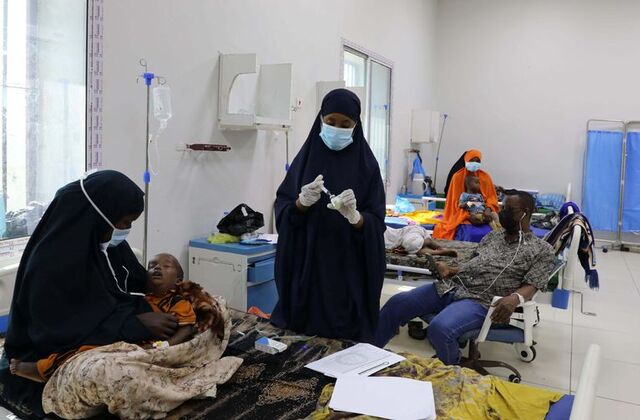
Patients suffering from diphtheria receive care inside a ward at De Martino Public Hospital during a diphtheria outbreak in Mogadishu, Somalia.
(The Post News)- According to reports, Somalia is facing a health emergency, as diphtheria cases in Somalia have more than doubled compared to last year. Diphtheria causes swollen glands, breathing difficulties, and fever but can be prevented through a vaccine widely available since the mid-20th century.
Diphtheria Cases Surge in 2025
General Director of the National Institute of Health Hussein Abdukar Muhidin asserted that there have been over 1,600 infections and 87 deaths so far in 2025, whereas in all of 2024, there were 838 cases and 56 deaths.
Health officials have warned that the sharp increase poses a serious risk to vulnerable communities, particularly children. Notably, most reported diphtheria cases in Somalia involve children, who are especially vulnerable to bacterial disease. Despite progress in childhood immunization rates, thousands of Somali children remain unvaccinated, leaving them at high risk of preventable diseases.
Diphtheria Spread Accelerated by Conflict and Displacement
The rise in Somalia’s diphtheria cases is being worsened by ongoing conflict and displacement. Families like that of Deka Mohamed Ali, who fled fighting in Ceeldheere, have been unable to access vaccines. All four of her children contracted diphtheria; one child died, while two others remain under hospital care in Mogadishu.
These tragedies highlight how insecurity and lack of healthcare access contribute to preventable deaths.
Health Minister Ali Haji Adam says efforts to contain diphtheria cases in Somalia are constrained by global vaccine shortages and recent U.S. aid cuts. With insufficient vaccine supply and weakened distribution networks, health workers are struggling to protect at-risk communities.
U.S. Aid Cuts Impact Somalia
Earlier this year, President Donald Trump slashed most foreign aid. Before that, the US had led humanitarian donations to Somalia, which relies almost entirely on donor funding for its health budget.
Adam explained, “The US aid cut severely affected the health funds we provided to Somalia. Many health centers ceased operations. Mobile vaccination teams that delivered vaccines to remote areas lost funding and have discontinued working.”
Moreover, the US government pledges a total of $149 million (R2.63 billion) in foreign aid to Somalia for the monetary year ending September 30, compared with $765 million (R13.48 billion) in the prior fiscal year. Meanwhile, a US State Department spokesperson affirmed, “The United States continues to provide essential foreign assistance in Somalia.”
Regarding concerns about the impact of aid reductions, the spokesperson added, “The United States remains the foremost nation in humanitarian giving worldwide, and we encourage other nations to significantly strengthen their humanitarian efforts.”
Effects of Funding Reductions on Healthcare
Last month, Save the Children reported that the loss of foreign funding forced the closure of hundreds of health clinics across Somalia this year. Since mid-April, the number of cases of diphtheria, measles, whooping cough, cholera, and severe respiratory infections has doubled due to these closures. Other major Western donors, including the UK, France, and Germany, have also reduced aid budgets.



